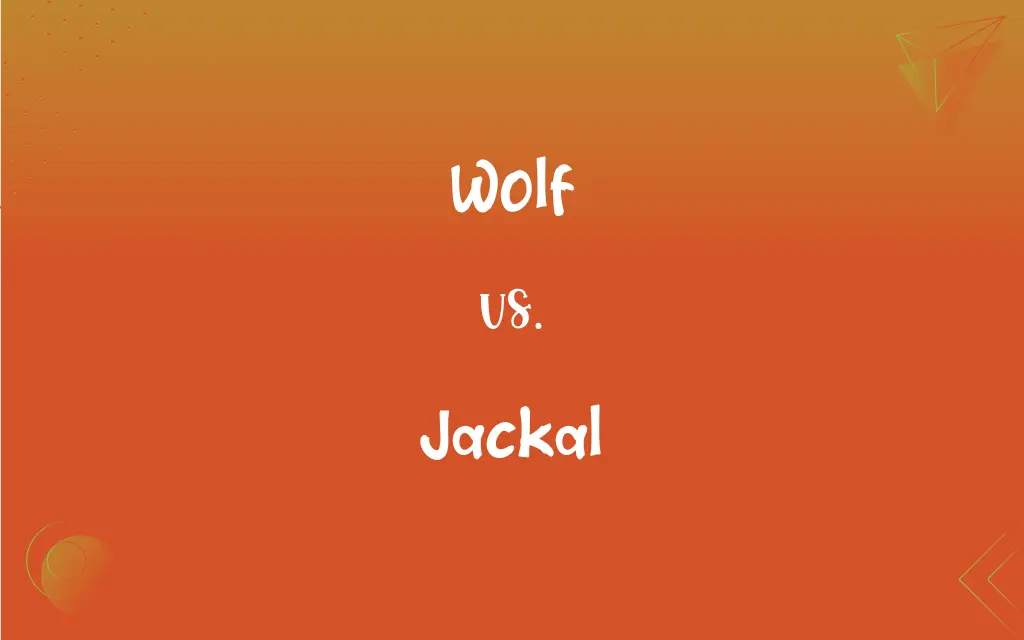Wolf vs. Jackal: What's the Difference?
Edited by Aimie Carlson || By Harlon Moss || Updated on July 5, 2024
Wolves are large carnivores from the Canidae family, while jackals are smaller, omnivorous canids found primarily in Africa and Asia.

Key Differences
Wolves and jackals both belong to the Canidae family, yet they differ significantly in size, habitat, and behavior. Wolves are generally larger, powerful carnivores often found in North America, Europe, and parts of Asia. Jackals, in contrast, are smaller in size and primarily inhabit regions in Africa and certain areas of Asia.
While both wolves and jackals are social animals, their pack dynamics and hunting strategies differ. Wolves are known to hunt in packs and can take down large prey such as elk or deer. Jackals, being smaller, often feed on smaller mammals, birds, and even fruits and plants, showcasing their omnivorous diet.
The vocalizations of a wolf and a jackal also serve as a distinguishing factor. Wolves are renowned for their iconic howls, which they use for communication, marking territory, or signaling to their pack. Jackals, however, have a more yipping or shrieking call, particularly noticeable during their nocturnal activities.
From a cultural perspective, wolves and jackals have different symbolisms across various societies. Wolves often symbolize strength, loyalty, and leadership in many cultures. Jackals, due to their scavenging habits, are sometimes associated with cunning and adaptability.
Comparison Chart
Size
Larger, powerful carnivore
Smaller omnivore
ADVERTISEMENT
Habitat
North America, Europe, parts of Asia
Primarily Africa and parts of Asia
Diet
Primarily large mammals
Mammals, birds, fruits, and plants
Vocalization
Known for howling
Yipping or shrieking calls
Cultural Symbolism
Strength, loyalty, leadership
Cunning, adaptability due to scavenging habits
Wolf and Jackal Definitions
Wolf
A large carnivorous mammal from the Canidae family.
The wolf is known for its haunting howl.
ADVERTISEMENT
Jackal
A creature often symbolized for cunning and adaptability.
Folk tales sometimes depict the jackal as a clever trickster.
Wolf
A predator known to live and hunt in packs.
The pack of wolves worked together to hunt down the deer.
Jackal
An animal known for its yipping calls during nocturnal activities.
The sound of the jackal echoed through the night.
Wolf
A mammal found in North America, Europe, and Asia.
The wolf's territory spans multiple continents.
Jackal
A mammal primarily found in Africa and parts of Asia.
The golden jackal is native to parts of Asia and Europe.
Wolf
A canine known for its sharp senses and hunting prowess.
The wolf detected the scent of its prey from miles away.
Jackal
A small to medium-sized omnivore from the Canidae family.
The jackal scavenged for food near the campsite.
Wolf
An animal often symbolized for strength and loyalty.
In many tales, the wolf represents fierce loyalty.
Jackal
A canine that feeds on a varied diet, from mammals to fruits.
The jackal adjusted its diet based on food availability.
Wolf
Any of several carnivorous mammals of the genus Canis, especially the gray wolf of northern regions, that typically live and hunt in packs.
Jackal
Any of several mammals of the genus Canis of Africa, Asia, and southeast Europe, that are chiefly foragers feeding on plants, small animals, and occasionally carrion.
Wolf
The fur of such an animal.
FAQs
Are wolves and jackals from the same family?
Yes, both wolves and jackals belong to the Canidae family.
Where are jackals primarily found?
Jackals are primarily found in Africa and parts of Asia.
What do wolves typically eat?
Wolves are carnivores, often hunting large mammals like deer or elk.
Are jackals carnivorous like wolves?
Jackals are omnivores, eating both meat and plant-based foods.
How many species of jackals are there?
There are several species, with the most common being the golden jackal, black-backed jackal, and side-striped jackal.
Do jackals have a symbolic meaning in cultures?
Yes, due to their scavenging habits, jackals are often symbolized for cunning and adaptability.
Do jackals have predators?
Yes, jackals can be preyed upon by larger predators like lions or hyenas.
What's the social structure of jackal groups?
Jackals can live in monogamous pairs or small family groups, often with offspring from previous years.
What's the typical vocalization of a jackal?
Jackals are known for their yipping or shrieking calls.
Can wolves adapt to different habitats?
Yes, wolves have a diverse range, from forests and plains to Arctic tundras.
Are there wolves in Africa?
Yes, the Ethiopian wolf is native to Africa, but it's different from larger wolves of the Northern Hemisphere.
How does the diet of a jackal vary?
Jackals adjust their diet based on availability, eating mammals, birds, fruits, and even plants.
Are wolves endangered?
Some wolf species or subspecies are endangered, while others have stable populations.
Which is larger, a wolf or a jackal?
Wolves are generally larger and more powerful than jackals.
Do wolves live in packs?
Yes, wolves are known for their pack dynamics and cooperative hunting.
How fast can a jackal run?
A jackal can run at speeds of up to 40 mph (64 kph) in short bursts.
Why do wolves howl?
Wolves howl for communication, marking territory, or signaling to their pack.
Are jackals nocturnal?
Yes, jackals are primarily nocturnal creatures.
How do wolves communicate within their pack?
Wolves use a combination of vocalizations, body language, and scent marking.
How long do wolves live in the wild?
Wolves typically live 6-8 years in the wild but can live longer in captivity.
About Author
Written by
Harlon MossHarlon is a seasoned quality moderator and accomplished content writer for Difference Wiki. An alumnus of the prestigious University of California, he earned his degree in Computer Science. Leveraging his academic background, Harlon brings a meticulous and informed perspective to his work, ensuring content accuracy and excellence.
Edited by
Aimie CarlsonAimie Carlson, holding a master's degree in English literature, is a fervent English language enthusiast. She lends her writing talents to Difference Wiki, a prominent website that specializes in comparisons, offering readers insightful analyses that both captivate and inform.































































